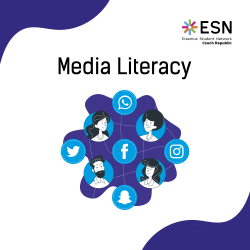Do not expect any simple lies that you reveal right after the first sentence. There is far greater evil behind all of this.
"Fake news" is designed and structured in a way that ordinary readers think they are true. Their task is to catch the reader's eyes as quickly as possible and evoke a strong emotional response. We see examples of such "fake news" quite often. Especially now in pandemic time, where we can see articles like this all-around social media. Therefore, be careful what you read. You can simply find out if an article is relevant and truthful, or whether it wants to negatively affect you and evoke an illusion in you that does not exist at all.
You can find out for yourself whether an article is relevant or not. In our previous article on media literacy, you will find tips on how to reveal if the information is truthful or fake.
http://esncz.org/blog/2021/03/05/media-literacy-how-get-through-all-information-0
Why does fake news exist?
Every piece of information has a goal. It is also the case with fake news, where we could divide this goal into two separate motives. The first motive is to make money. The other one focused on gaining power. Unfortunately, both forms of fake news are equally dangerous. But let's explain why.
"Money"
Nowadays, we mostly get our information through social media. There are plenty of serious articles, but we can also find many unserious and potentially dangerous ones. In those articles, there is information that we cannot identify as truthful or fake. It is a huge opportunity for misinformers and fake news distributors to get what they want. Usually, we see a headline that interests us, and we click on the links without a thought. After clicking there, nothing beneficial awaits us. It is an article with zero value. But why do the authors write such an article? And how do they get money from it?
By most people clicking on the article based on an "enticing title", the author gets a great opportunity for earning money. They get them for every click because after loading the article, countless ads will jump on you. The author usually cares more about them than the quality content of the article. After all, he does it for the money.
By clicking on such articles, not only does someone earn money from us, but the more we click on such resources, the more our social media becomes overwhelmed by this type of news. Among other things, we are also becoming an easy target for hackers who like to use this weakness of ours to spread the virus, phishing emails or spam. Therefore, it is necessary to pay attention to what we click on while visiting social networks and whether this type of article is worth reading at all.
(https://www.commonsensemedia.org/news-and-media-literacy/where-do-fake-news-generators-come-from)
"Power"
Although mostly, we link the word politics with power. People are not spreading fake news only because of personal power growth. Also, It is often associated with propaganda.
Politics is a great example of how to get power through fake news. Unfortunately, most politicians do this using false news to push a group of their supporters to disrupt society or get to the top by lying. It is a shame that false reports are effective enough to change the outcome of close elections, destroy social cohesion and undermine people's will and actions. Politicians are the ones who question reporting of the serious media and who are enforcing their lies as it suits them.
For example, an article from the American magazine The New Yorker shows Trump's attack on the press. In this article, Trump was interviewed by reporter Lesley Stahl from CBS News. She asked Trump why he is attacking the press. He replied, "Do you know why I'm doing this? I do this to discredit you all and humiliate you all so that if you write negative stories about me, no one will believe you." And that is called the power of false news.
(https://www.newyorker.com/magazine/2020/12/07/the-cost-of-trumps-assault-on-the-press-and-the-truth)
Why do people believe in fake news?
Today's spread of false news is as fast as ever before. On the Internet, we encounter a lot of information that we do not immediately perceive as truthful, but at the same time, we do not perceive it as false information. After all, we can't discredit it.
There are several reasons why people fall for fake news. The most common include: "The more people share the same misinformation, the more we take it for granted." It goes hand in hand with other reasons, such as the inability to verify the information. It can be affected by the illiteracy of the reader, eagerness, or laziness; after all, it has the same result. The reader is also affected by the pressure of society, the pressure of the environment, and the emotional mood. Even what the reader is doing has a significant effect on how the processor processes it.
https://www.psychologytoday.com/za/blog/thoughts-thinking/201911/7-reasons-why-we-fall-fake-news
A study by Hiroko Kanoh showed that people are more eager to believe fake news and misinformation is higher when they eat and drink. This is due to the fact, at this stage, people are usually in a relaxed mode and do not think too much about information. We can say that their critical thinking is turned off.
https://www.sciencedirect.com/science/article/pii/S1877050918313851
Summary
Social media is an excellent tool for learning. Unfortunately, it is also a great platform for spreading false news. Disinformation is an extremely complex matter that affects all aspects of human activity. That is why we have to be careful while using them. It is important to know what we are believing in when clicking on any article. After all, we believe in something we think is true. Let's finish with a quote from one article:
"Truth is a precarious thing, not because it doesn’t objectively exist, but because the incentives to warp it can be so strong. It’s up to each of us to seek it out."

